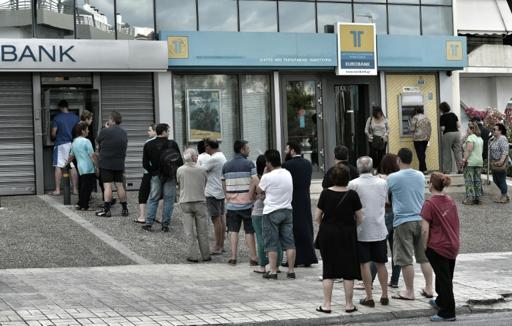The European Central Bank was set to hold an emergency meeting Sunday amid mounting fears Greece's banks will be unable to open next week, as the debt-stricken country hurtled closer towards a possible exit from the eurozone.
Greece's crisis deepened Saturday after its European partners responded to Prime Minister Alexis Tsipras's call for a referendum on bailout proposals by refusing to extend a critical financial lifeline after it ends on Tuesday.
The ECB is expected to play a critical role in ensuring Greek banks have the cash to open, after long queues formed at cash machines across the country at the weekend on fears capital controls would be introduced in the face of Athens' looming default on a huge IMF repayment.
Parliamentarians late Saturday voted in favour of the referendum -- a shock announcement by radical leader Tsipras after his government rejected the latest debt deal -- saying it involved further austerity measures that would cause "humiliation" to the Greek people.
The referendum on July 5 will ask Greeks to say "yes" or "no" to the measures submitted by creditors to Athens on Friday at one of the final rounds of negotiations.
In a speech before parliament's vote, Tsipras said he was confident "the Greek people will say an emphatic no to the ultimatum" by the country's EU-IMF creditors, but "a big yes to European solidarity".
Angry eurozone finance ministers accused Greece of "unilaterally" breaking off talks and said they would not extend the bailout past June 30, the same day a 1.5 billion euro ($1.7 billion) payment to the International Monetary Fund falls due.
"It was not us who walked away from the talks, it was the Greek government that walked away," a grim-faced Eurogroup president Jeroen Dijsselbloem said after tense negotiations in Brussels.
But he added: "Our door is always open."
Fight contagion danger
A week of intensive talks in Brussels ended with Greece's creditors on Friday offering Athens a five-month, 12-billion-euro extension of its rescue programme, on condition it committed to fresh reforms.
Syriza has repeatedly refused to make cuts to pensions and changes to the VAT system demanded by Greece's debtors -- the "troika" of the European Commission, European Central Bank and International Monetary Fund.
EU heavyweights Germany and France insisted Saturday that Greece would remain inside the 19-country eurozone, as fears grew about the future of the single currency.
"Greece remains a member of the eurozone and Greece remains part of Europe," said Germany's powerful Finance Minister Wolfgang Schaeuble, while his French counterpart Michel Sapin said Greece's "destiny" was in the euro.
But with fears the crisis could spread, the ministers later met without Greece to discuss the "consequences" of a possible "Grexit" and to insist they would "preserve the integrity and stability of the euro area" Dijsselbloem said.
"We will do everything to fight against any possible danger of contagion," added Schaeuble in an attempt to calm global markets before they open on Monday.
Frozen out of the talks, Greek Finance Minister Yanis Varoufakis left saying: "It's a sad day for Europe, but we will overcome it."
But he added that the refusal to grant his request to extend the bailout "will certainly damage the credibility for the Eurogroup as a democratic union and I am very much afraid the damage will be permanent".
Greece's negotiations with its international creditors have dragged on since January, when Tsipras's Syriza party first took power on a promise of ending austerity measures demanded by the EU and IMF in return for two bailouts worth 240 billion euros.
Teach Greece a lesson
Pablo Iglesias, the leader of Spanish anti-austerity party Podemos, said some European countries and the IMF wanted to "strangle Greece (and) teach a lesson" to other anti-austerity parties in Spain.
"The IMF and the German government are attacking democracy. They are destroying the European political project," Iglesias, a Tsipras ally, told reporters after the Greek debt negotiations broke down.
Greece was stunned by the referendum announcement, which came just hours after the crisis summit with European leaders.
According to two polls published in the Sunday press, carried out just before the referendum was announced, a large majority of Greeks favoured a deal with the creditors.
On the streets of Athens, queues built up at cash machines as fears mounted that the banks would not open on Monday and the government could impose capital controls to stop more deposits fleeing the country.
ATMs in the Athens parliament ran dry while in Greece's second city, Thessaloniki, some banks have run out of money, according to an AFP reporter.
"I have a shop. I came to the bank to withdraw as much money as I can in order to cover the needs of my shop for next week," 42-year-old Maria Kalpakidou told AFP.
Demand at petrol stations was also said to have "heightened" but there were no fuel shortage problems, according to state news agency ANA.




















































